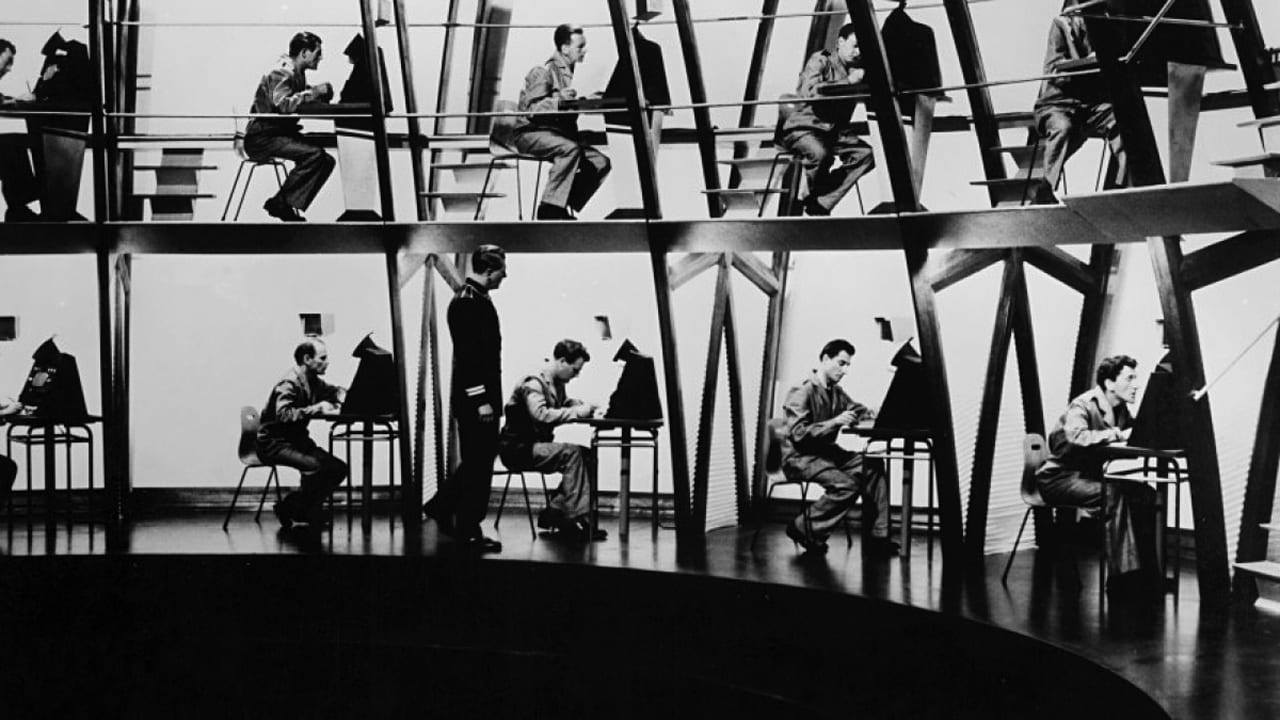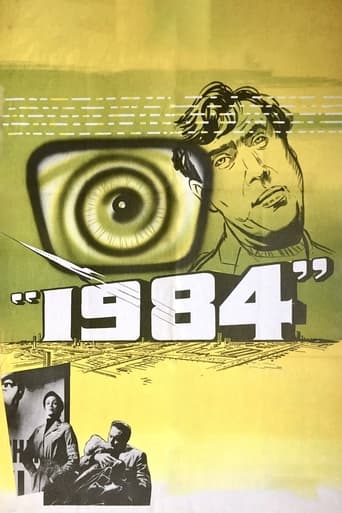

Most undeservingly overhyped movie of all time??
... View MoreThe movie's neither hopeful in contrived ways, nor hopeless in different contrived ways. Somehow it manages to be wonderful
... View MoreThe joyful confection is coated in a sparkly gloss, bright enough to gleam from the darkest, most cynical corners.
... View MoreIf you're interested in the topic at hand, you should just watch it and judge yourself because the reviews have gone very biased by people that didn't even watch it and just hate (or love) the creator. I liked it, it was well written, narrated, and directed and it was about a topic that interests me.
... View MoreAt least the United States and its allies had laws protecting freedom of speech, freedom of the press, and the ideals of life, liberty and the pursuit of happiness. This is an early view of a horrific future, the type of film that paranoia creates in the mind that there's more going on than meets the eye. Of course there is, and are we better off not knowing about it? That's just one of the questions asked in this first film version of the George Orwell novel, filmed again ironically in 1984 and redone as a Broadway play produced at another stage of fear, paranoia, and the unknown.A nuclear war destroyed democracy as the world knew it, and with part of the world under the thumb of an unseen leader only known as "Big Brother", freedom is believed to be slavery, war means peace, and ignorance of the truth is a must for survival. With the government changing history, forbidding sexual relations and turning the rest of the world into an enemy demanding of hatred, this is a 1984 I'd rather not experience, and for new lovers Edmund O'Brien and Jan Sterling, the beginning of the end. They are surrounded by a strange world of brainwashed individuals who only see big brother as an all knowing God, chances for escape are slim. Neighbors are against neighbors, little girls suspect everything you do of being a threat to big brother, and suspected traitors are not only wiped out, but eliminated from the memory of those who knew them as well. No freedom, no peace, no time to yourself, no allowance of your own thoughts and ideals. It's an ugly view of an unthinkable time, a reminder that freedom is never free, never taken for granted, and an opening to thoughts of what's going on under our noses that need to be dealt with immediately so all we cherish is never eliminated. A brilliant script with somber performances, made to keep the movie theaters it played in as quiet as quiet can be, and a numbing view of one of many forms of world domination that must be prevented. Otherwise, the only peaceful existence in a world so evil is death.
... View MoreThis movie is a good adaptation of the George Orwell's 1949 novel. Not as good as the book, but is certainly isn't bad. In the future run by the Oceanic government entity "Big Brother", Winston Smith (Edmond O'Brien) has the job of rewriting history. Although a skillful worker, Winston doesn't like his job and he likes the party even less. Life is dull until he meets Julia (Jan Sterling) with whom he falls in love. The couple hates the party and join an underground resistance organization known as "the brotherhood." They enlist under the guidance of O'Connor (Michael Redgrave) a wealthy party member who seems to be a man of the people. But when Winston and Julia are arrested, O'Connor reveals himself to be a member of the thought-police, a government organization which controls private thoughts. I won't tell the rest, because anybody who has read the book, knows what happens. Although a good film adaptation, it doesn't fully do the novel justice and takes creative liberties (for instance O'Connor's real name in the book is O'Brien.) But as a film it works well, and it basically tells the book's story effectively. Watch it after you read it.
... View More***SPOILERS*** George Orwell's film based on his book "1984" about a future totalitarian state is more shocking now then it was it was first released some 60 years ago. With new speak and thought police now so common in our everyday language it was Orwell who coined those phrases that are so accurate in today's society. In the film party member Winston Smith, Edmond O'Brian, tries to fight the totalitarian government that he works and slaves for but ends up a mind numbed zombie for doing it. It was with his fellow party, of Oceania, member pretty blond Julia, Jan Sterling, that Winston tried to start a revolution but sadly found that only he he besides Julia were wiling to risk their lives or sanity in doing it.***SPOILERS***Back-stabbed and betrayed at every turn by a number of so-call friends who claimed to be on board with them in the end both Winston & Julia were turned into the thought police by those that they trusted most inner Party man O'Connor, Michael Redgrave, and junk shop owner Carrington, David Kossoff, to be tortured and re-educated by the state. It was love, that was outlawed by the state, that first brought both Winston & Julia together but fear by those whom they most trusted most that in the end did them both in. And it was fear or rule by fear that the government, Oceania, kept it's citizens in line.P.S We never really get to see the "Big Guy" called "Big Brother" or "Be-Be", as he's so affectionately called by his terrified and enslaved people , who's running this entire ruthless and sleaze ball operation that causes so much suffering for it's people but we do see posters of him plastered all over the place. From what we see of the posters of "Be-Be" he look a lot like the then dictator-like Director of the F.B.I J. Edger Hoover!
... View MoreAfter wanting to see this movie for about three decades and after teaching the book for almost two, I finally found a copy recently and was surprised by two things: 1) how surprisingly faithful this movie is at times, even more so in certain parts than the definitive 1984 version; and 2) just how painful it is to watch something that bowdlerizes a story you're intimately familiar with.On the one hand, the 1956 version gets the larger picture of Orwell's dystopia completely wrong. Much like the BBC version of two years previously, the movie ignores Orwell's descriptions of Airstrip One as a ruined and war-torn version of London for the most part, and such places as the Ministry of Truth and the canteen look like every other 50s sci-fi movie's version of the 1980s. (They even change Goldstein's name to something futuristic-sounding and unmemorable, though they may have been to avoid any hint of anti-Semitism.) No wonder Orwell's widow hated it so.It's also no surprise that both Julia and O'Brien (oops, sorry, it's O'Connor here, probably because of the lead actor's name being too close to O'Brien) are able to spot Winston as different: Edmund O'Brien plays Winston not as an intellectual stuck in a society antithetical to intellectual thought but as a bit of a gormless idiot, a man who has to be told repeatedly "That photo does not exist. Yes, that one in your hand. Yes, THAT one. It doesn't exist. What, are you deaf?" It's hard to imagine THIS Winston Smith lasting for very long in the actual novel, let alone the 1984 version of the movie. This Winston is also enough of an idiot to believe that the steely, vaudeville villain-eqsue O'Connor could ever be sympathetic - though, to be fair, that's more to do with Michael Redgrave deciding to play the part without an ounce of subtlety, and neither movie does a decent job of explaining why Winston trusts O'Brien in the first place. Of the three actors to play this part, it's definitely Burton first, then André Morell, then Redgrave far in the rear. And don't even get me started about trying to do a movie in the 50s about a society trying to abolish the orgasm...And yet the movie gets some bits absolutely right. Winston's visit to O'Brien's quarters, unlike the similar visit in the later version, includes Julia and includes her objection to O'Connor's suggestion that they may someday have to separate. (All these years, I thought that scene occurred in the later version, too, but rewatching it the other night revealed that it doesn't.) It also gets some of the broader strokes right, too: I hadn't expected the Two Minute Hate to work so well in this futuristic setting, nor to have the torture scenes make any sense. Still, give me the later version anyday over this one. This is definitely your grandfather's 1984, not Orwell's.
... View More